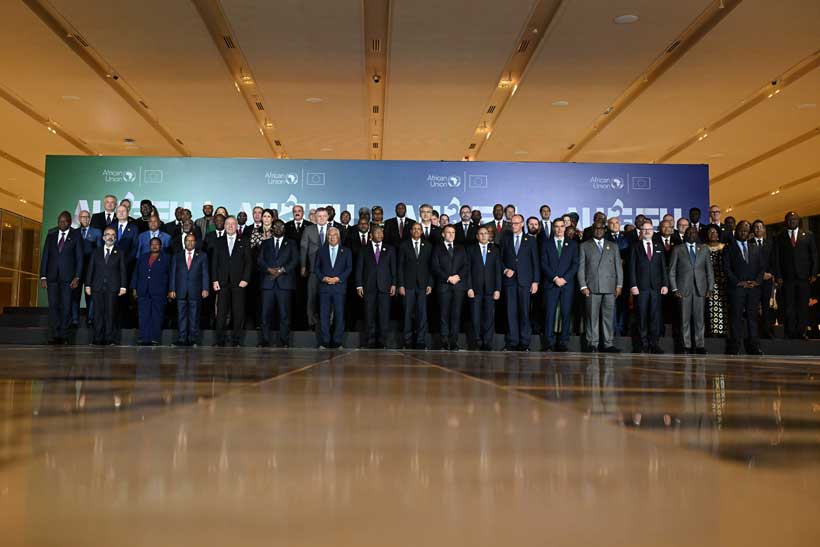The 7th African Union (AU) and European Union (EU) summit in Luanda, Angola, signaled support for Africa’s development in the coming years. Angolan President João Manuel Gonçalves Lourenço hosted the summit on 24-25 November 2025. The unique discussions between African and European leaders and the various partnering organizations underlined invaluable guarantees to undertake opportunities for strengthening long-term economic, cultural, and political ties in the continent.
Chairperson of the AU Commission, Mahmoud Ali Youssouf, at the 7th AU-EU summit in Luanda, underscored that Africa brings not only vast resources to this partnership but also demographic dynamism, technological ambition, and a vibrant generation of innovators. Europe can contribute capital, technology, and institutional cooperation. By aligning these strengths around shared priorities that include digital transformation and youth empowerment, both continents can shape a more prosperous future.
According to Mahmoud Youssouf, Africa is emerging as a global growth powerhouse and therefore calls for balanced trade partnerships and stronger multilateralism with members of the European Union.
South African President Cyril Ramaphosa, who chaired the G20 Leaders’ Summit, the first to be convened on African soil since the African Union became a permanent member of the G20, highlighted economic growth and job creation while stressing the importance of stronger economic ties and regional integration with European partners.
In their speeches at the Summit, President of the European Commission Ursula von der Leyen and President of the European Council António Costa shared the development visions for the African continent and the financial mechanisms reaffirming commitment to the Joint Vision for 2030 and the AU’s Agenda 2063. These are implemented under the framework of the EU’s Global Gateway.
Shaping the future for Africa and Europe
The AU and EU adopted a joint declaration that reinforces cooperation in significant thematic areas, including peace, security, sustainable development, and regional integration. It also outlines an institutional structure and funding mechanisms for key actionable areas within a long-term framework for cooperation.
In the adopted document, the EU reassured its support for Africa’s development priorities, determined to advance partnership and to unlock new opportunities, and looked forward to an ambitious post-Agenda 2030 framework.
Leveraging public and private funds to stimulate investments and improving investment and business climate across the continents remain key and reaffirm commitment to ensuring the transformative impact of these investments. It identified financial institutions, in particular the European Investment Bank (EIB), the African Development Bank (AfDB), and public development banks, agencies, and similar bodies for providing finance.
The EU guarantees to continue supporting African countries to develop, industrialize, diversify exports, and integrate into regional markets. It will also accelerate the implementation of the African Continental Free Trade Area (AfCFTA).
In terms of investing in education, research, science, technology, and skills development as a basis for driving scientific discoveries and innovative solutions, the EU acknowledged the importance of the youth as drivers for sustainable development and committed to supporting their empowerment and active participation. Therefore, the EU promised partnerships between universities and research organizations to foster mutual understanding and excellence.
Cooperation on Peace, Security, and Governance
There has been long-standing AU-EU cooperation on peace, security, and governance, including conflict prevention, peace mediation, and stabilization, premised on African-led solutions. Both the AU and EU agreed on a commitment to further strengthening dialogue and cooperation, including through the annual consultations between the AU Peace and Security Council and EU Political and Security Committee as well as the annual AU-EU Human Rights Dialogue.
Acting under a UN mandate, the EU pledged sustainable financing for AU-led Peace Support Operations. The document recognizes the African Union Peace and Security Council’s and the European Union Political and Security Committee’s contribution to the maintenance of peace, security, and stability in both continents and in promoting effective governance, and we welcome the AU’s efforts to silence the guns in Africa in line with Aspiration 4 of the AU Agenda 2063.
Stronger Commitment to Multilateralism
Both the AU and EU agreed to work towards more converging positions in multilateral fora to ensure an effective multilateral system with the UN at its core, based on international law and true to the purposes and principles of the UN Charter.
The Summit welcomed the contributions from the meetings of the European Parliament and the Pan-African Parliament in Midrand, South Africa. It encourages continued engagement of all relevant stakeholders in advancing the partnership. It finally registered joint commitment to international order based on international law and effective multilateralism grounded in international law, including the Charter of the United Nations.
The African Union and the European Union expressed profound gratitude to the President of the Republic of Angola, João Manuel Gonçalves Lourenço, and to the Angolan Government and people for the warm reception, hospitality, and excellent organization of the 7th AU-EU Summit.


